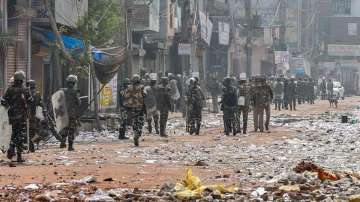2020 Delhi riots: A Delhi court on Monday acquitted four persons accused of rioting and vandalism in the national capital in 2020. While hearing a case related to the communal violence that shook northeast Delhi in 2020, the court said the prosecution was unable to prove its case beyond a reasonable doubt.
The court was hearing the case against Shahrukh, Ashu, Zuber and Ashwani, who were accused of being a part of a riotous mob that set ablaze tractors and hand carts and ransacked school buses at a parking lot at Kardam Puri in Delhi on February 25, 2020.
"Prosecution has not been able to prove its case against the accused persons beyond a reasonable doubt, which is the touchstone of criminal law. Hence, all four accused persons are acquitted of all the offences," Additional Sessions Judge Amitabh Rawat said in a recent order.
The court noted that according to the prosecution, two witnesses had identified the accused.
However, in their examination-in-chief, the said witnesses deposed that they had never identified any rioters or told the investigating officer about the identity of the accused, the court pointed out.
Both witnesses categorically denied that the four accused were involved in the present case of rioting and instead, said they did not know them, the court said.
Thus, nothing incriminatory had come on record against the accused, it added.
The Jyoti Nagar police station had filed a chargesheet against the accused under various provisions of the Indian Penal Code (IPC), including those related to rioting, armed with deadly weapon, unlawful assembly and mischief by fire or explosive substance with an intent to destroy houses etc.
The 2020 Delhi riots
Northeast Delhi saw brutal riots after supporters and opposers of the Anti-Citizenship Amendment Act (CAA) took to the streets. The violence took a communal turn and led to the death of over 53 people over the course of the next 10 days.
More than 200 were left injured.
Shops and houses were burnt down and even places of worship were attacked.
Protests initially began in Delhi and other parts of the country in December 2019 in response to the passage of the Citizenship Bill, which paved the way for the grant of citizenship to Hindus, Sikhs, Parsis, Jains, Buddhists and Christians who took refuge in Pakistan, Bangladesh and Afghanistan in or before December 2014.
The Act was seen by protestors as discriminatory to Muslims and threatening their existence in India when combined with the National Register of Citizens (NRC).
Several demonstrations were held in cities like Delhi, Mumbai, Hyderabad, Lucknow, Aligarh, Bengaluru, Kolkata and other parts of the country.
Most of the protests were peaceful, barring a few incidents of stone-pelting and burning of vehicles.
Peaceful protests in Delhi's Shaheen Bagh, led mostly by women who endured the national capital's biting cold, drew a lot of attention, especially before the Delhi Assembly election of February 2020, and became a symbol of women-led anti-CAA protests across the country. However, their demonstration caused road blockage, much to the discomfort of commuters.
Also Read | 2020 Delhi riots: SC refuses to stay criminal proceedings against ex-AAP councillor Tahir Hussain
Latest India News
